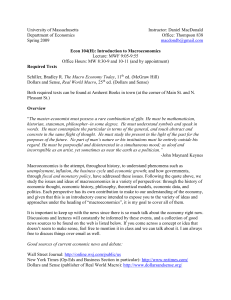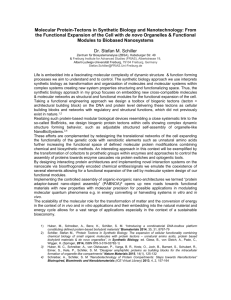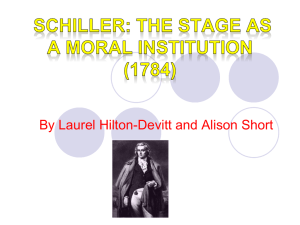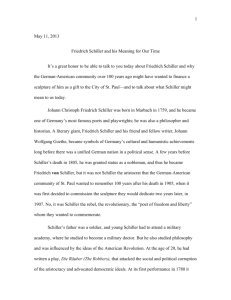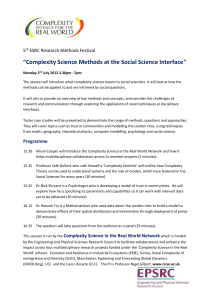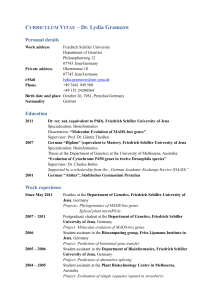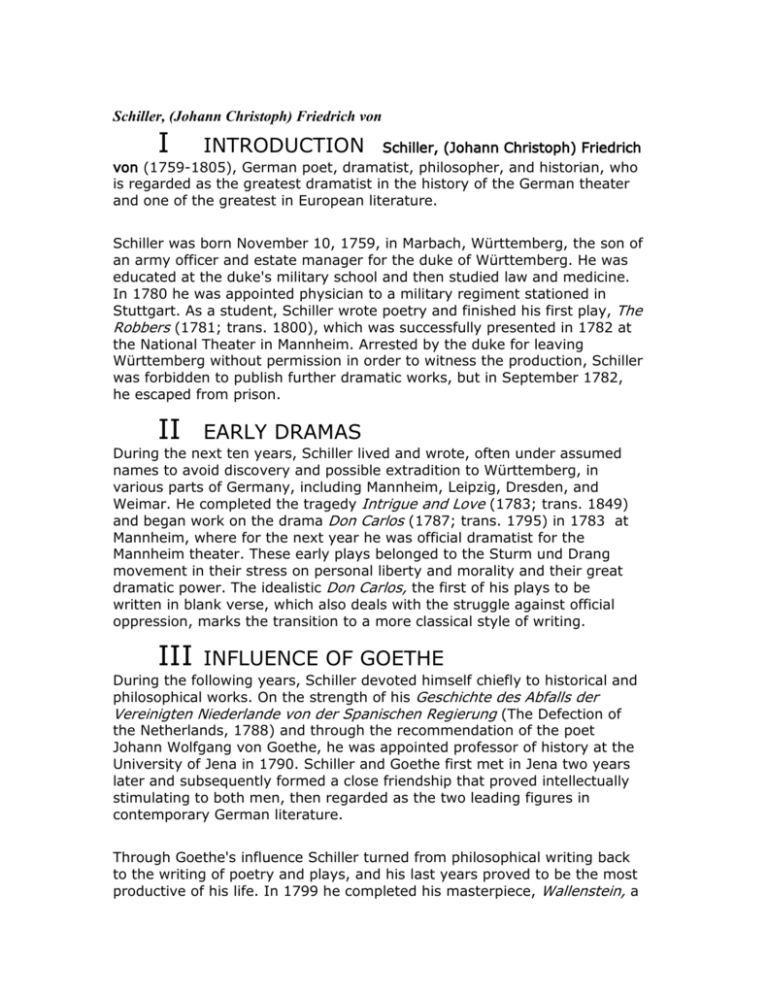
Schiller, (Johann Christoph) Friedrich von
I
INTRODUCTION
Schiller, (Johann Christoph) Friedrich
von (1759-1805), German poet, dramatist, philosopher, and historian, who
is regarded as the greatest dramatist in the history of the German theater
and one of the greatest in European literature.
Schiller was born November 10, 1759, in Marbach, Württemberg, the son of
an army officer and estate manager for the duke of Württemberg. He was
educated at the duke's military school and then studied law and medicine.
In 1780 he was appointed physician to a military regiment stationed in
Stuttgart. As a student, Schiller wrote poetry and finished his first play, The
Robbers (1781; trans. 1800), which was successfully presented in 1782 at
the National Theater in Mannheim. Arrested by the duke for leaving
Württemberg without permission in order to witness the production, Schiller
was forbidden to publish further dramatic works, but in September 1782,
he escaped from prison.
II
EARLY DRAMAS
During the next ten years, Schiller lived and wrote, often under assumed
names to avoid discovery and possible extradition to Württemberg, in
various parts of Germany, including Mannheim, Leipzig, Dresden, and
Weimar. He completed the tragedy Intrigue and Love (1783; trans. 1849)
and began work on the drama Don Carlos (1787; trans. 1795) in 1783 at
Mannheim, where for the next year he was official dramatist for the
Mannheim theater. These early plays belonged to the Sturm und Drang
movement in their stress on personal liberty and morality and their great
dramatic power. The idealistic Don Carlos, the first of his plays to be
written in blank verse, which also deals with the struggle against official
oppression, marks the transition to a more classical style of writing.
III
INFLUENCE OF GOETHE
During the following years, Schiller devoted himself chiefly to historical and
philosophical works. On the strength of his Geschichte des Abfalls der
Vereinigten Niederlande von der Spanischen Regierung (The Defection of
the Netherlands, 1788) and through the recommendation of the poet
Johann Wolfgang von Goethe, he was appointed professor of history at the
University of Jena in 1790. Schiller and Goethe first met in Jena two years
later and subsequently formed a close friendship that proved intellectually
stimulating to both men, then regarded as the two leading figures in
contemporary German literature.
Through Goethe's influence Schiller turned from philosophical writing back
to the writing of poetry and plays, and his last years proved to be the most
productive of his life. In 1799 he completed his masterpiece, Wallenstein, a
three-part work in verse that includes a narrative prologue, Wallensteins
Lager (Wallenstein's Camp), and two full-length dramas, The Piccolomini
(trans. 1800) and The Death of Wallenstein (trans. 1800). Based on events
of the Thirty Years' War (1618-1648), the entire work is considered by
many one of the greatest historical dramas in world literature.
IV
WEIMAR PERIOD
Late in 1799 Schiller settled permanently in Weimar, where he
subsequently completed the historical verse dramas Maria Stuart (1800;
trans. 1833), The Maid of Orleans (1801; trans. 1835), Die Braut von
Messina (The Bride from Messina, 1803), and William Tell (1804; trans.
1825). At the time of his death on May 9, 1805, he was at work on the
tragedy Demetrius.
As a whole, Schiller's plays are characterized by moral idealism, strong
optimism, eloquent poetic diction, and a classic sense of form.
V
OTHER WORKS
Schiller also translated foreign plays into German, including Macbeth by
Shakespeare and Phèdre by the French poet Jean Baptiste Racine. His
historical works include the Geschichte des Dreissigjährigen Krieges
(History of the Thirty Years' War, 1791-1793). Among his philosophical
works are the Briefe über die Ästhetische Erziehung des Menschen (Letters
on the Aesthetic Education of Man, 1795) and Über Naive und
Sentimentalische Dichtung (On Naive and Sentimental Poetry, 1795-1796).
His poetic works include the philosophical lyric “Das Ideal und das Leben”
(Ideal and Life, 1796); the famous “Das Lied von der Glocke” (The Song of
the Bell, 1800); and “An die Freude” (Ode to Joy, 1785), which was set to
music by the composer Ludwig van Beethoven in the Ninth Symphony.1
1"Schiller, (Johann Christoph) Friedrich von."Microsoft® Encarta® Encyclopedia 2001.
© 1993-2000 Microsoft Corporation. All rights reserved.



